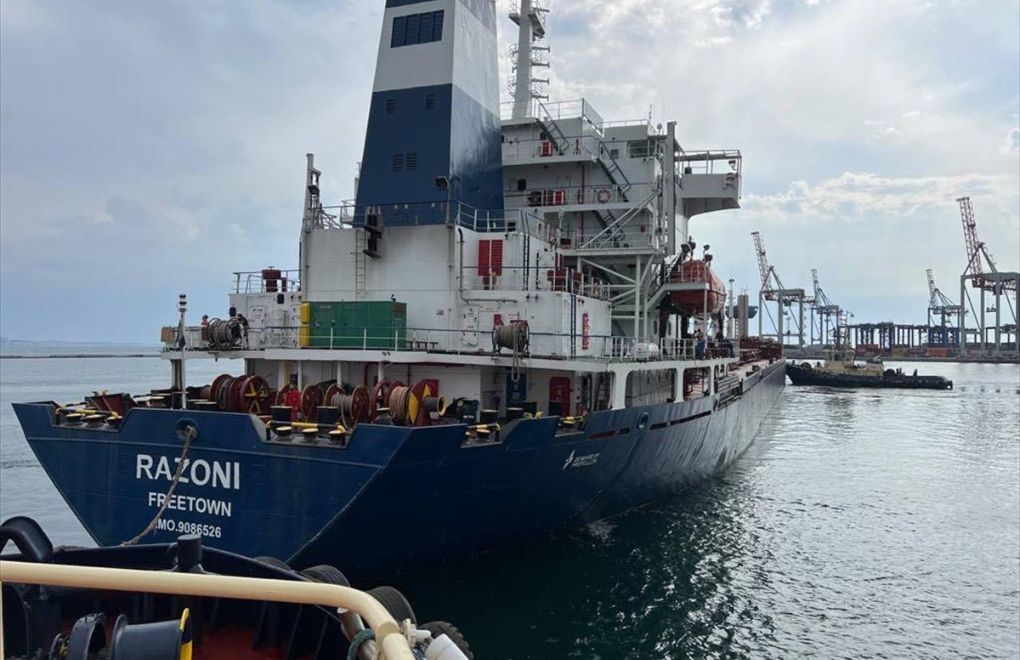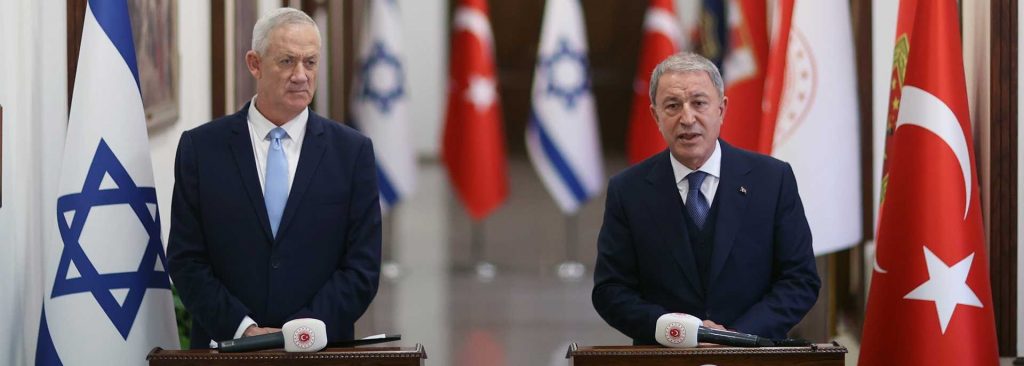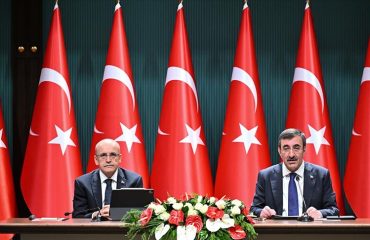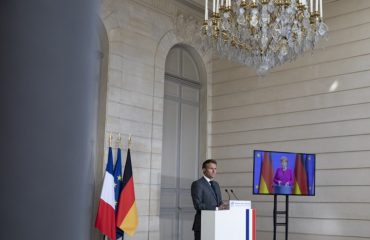

Russia suspended the agreement to export grain and food from Ukraine, showing that the Russian winter for Europe will not be limited to natural gas shortages. The Ministry of National Defense has announced that more than 9 million tonnes of grain have been shipped since the agreement was issued. (Photo: MSB)
The developments in the last five days have shown that Türkiye is facing the cold reality of a “Russian winter”.
The Russian winter affects every country and region differently. In Europe, the Russian winter has an impact because of natural gas shortages and the domestic policy problems that it will bring. The Russian winter has already begun to affect Türkiye’s economy and foreign policy.
The rapid developments in the last five days are a sign of this.
At the top of the developments is neither the possible visit of Swedish Prime Minister Ulf Kristersson to Ankara, where it will be clear whether he will sacrifice the PKK for NATO membership nor the arrival of Israeli Defense Minister Benny Gantz in Ankara after 12 years. Currently, the world’s ears and eyes are on Russia’s decision to suspend the agreement on the export of grain from Ukraine.
Let’s take a closer look at that first.
Is the Sevastopol attack the real reason?
On the morning of October 29, the governor of the city of Sevastopol in the Crimea annexed by Russia announced that an attack of unmanned drones and sea vehicles, which began at 04:30 on the headquarters of the Russian Black Sea Fleet, was repelled. A few hours later, the Russian Ministry of Defense claimed that Britain was behind the attack carried out by Ukrainian special operations units. On the same day, the Russian Foreign Ministry announced that they had suspended the Ukrainian grain export agreement, which was going to expire on November 18.
With the initiatives of Türkiye and the United Nations, the 14 ships on board and those still awaiting inspection in Istanbul were excluded from the decision; but Russia has announced that it will not allow any more ships to leave Ukraine until the problem is resolved.
According to the evaluations in Ankara, the Sevastopol attack was the crux of the tension that Russian President Vladimir Putin had expressed for a while, including his meeting with President Tayyip Erdogan in Astana on October 13. Russia wanted to export grain and fertiliser under the agreement signed with the UN but developed resentment towards the UN because it could not achieve this.
US and EU sanctions
In fact, on July 22, not one but two grain and food export agreements were signed in Istanbul. The first was the agreement on the export of grain and food from Ukraine, of which Türkiye is also a signatory. The second was signed between Russia and the UN, and it envisaged that Russia could also export grain and fertilizer.
Countries suffering from food scarcity, particularly in Africa, are reliant on Russian and Ukrainian grain. This reliance accounted for 80 percent of consumption in critical countries such as Egypt. But the sanctions announced by the USA and EU on companies and individuals doing business with Russia caused individuals and companies that did not want to be blacklisted by the USA and EU to stay away from trade with Russia.
Let us remind you that a US delegation held talks in Ankara and Istanbul between 17-20 October in order to warn Turkish companies regarding the sanctions.
Russian winter
Elizabeth Rosenberg, Assistant Secretary of the Treasury for Terrorism Financing and Financial Crimes, and Erik Woodhouse, Assistant Secretary of State for Financial Threats and Sanctions, met with official and non-governmental institutions and made warnings that amount to an imposition of US domestic law on Türkiye.
These sanctions, which no longer threaten governments but companies and individuals, prevent Russia from selling its exported products. On the one hand, Russia blames the UN, which it has signed an agreement with, and on the other hand, tries to break the sanctions, at least in the field of agriculture, by putting Türkiye into action, although it will not put the weight on the Black Sea ports.
The Russian winter threatens Europe with gas and electricity shortages, and the US winter of sanctions threatens Russia with the cash shortage it expects from exports.
It is a difficult equation, and Türkiye is one of the elements in this equation, with difficult turns in both diplomacy and the economy.
Egypt and the arrival of the Israeli minister
Speaking to Al Arabiya television in the United Arab Emirates on October 29, when Russia suspended the grain agreement, Egyptian Foreign Minister Semih Shukri announced that they had stopped talks to normalise relations with Türkiye. The reason, he explained, was Türkiye’s Libya policy; the energy deal with Libya disturbed Egypt just as much as Greece.

Visiting Ankara on October 27 as the guest of the Minister of National Defense Hulusi Akar, Israeli Defense Minister Benny Gantz could become the Israeli Prime Minister after the November 1 elections. (Photo: MSB)
However, the evaluations in Ankara indicate that the normalization of Türkiye-Israel relations also disturbs Egypt.
Israeli Defense Minister Benny Gantz was in Ankara on October 27 upon the invitation of Minister of National Defense Hulusi Akar. This was the first time an Israeli Defense Minister had visited Türkiye since the Mavi Marmara incident in 2010.
It was more of a symbolic visit, given the possibility that the government might change, and Gantz even could become Prime Minister in the November 1 Israeli elections. President Erdogan also received Gantz.
Although it was said that there was talk of defence industry cooperation, the main topic was energy. Israel has recently signed an energy cooperation agreement with Lebanon. It is noteworthy in this regard that Erdogan received former Lebanese Prime Minister Saad Hariri the day after he met with Gantz.
Naturally, the re-establishment of the Turkish-Israeli balance in the Eastern Mediterranean disturbs Greece and Egypt in terms of the fact that both countries have open channels with Russia, but it also opens the door to new challenges.
Sweden, NATO, PKK
In the beginning, we said the last five fast days. Five days ago, on October 26, Erdogan accepted Swedish Prime Minister Kristersson’s request to visit him. This visit is expected to take place within ten days.
It is natural that US Ambassador Jeff Flake mentioned this visit, just like the F-16s, during his visit to the Minister of Defense Akar, one day after the Israeli Minister of Defense’s visit, and the schedule was “coincidental,” according to official sources.
Since then, it was an important development when Kristersson and the Finnish Prime Minister, Sanna Marin, said in a joint statement that they would work with Türkiye on its security concerns, which they said they saw as legitimate.
However, Ankara wants to see action, not words, on this issue. In other words, will Sweden and Finland, which want to become NATO members before the Russian winter, fulfil Türkiye’s demand that “extradition of PKK and FETO members is not enough, their activities there must be prevented”? Such a development will undoubtedly affect countries which are NATO members, such as Germany, the Netherlands, France, and Belgium, where these organisations operate intensively.
Türkiye’s close ties with Russia seem to have helped it gain more power in NATO.
It is also useful to evaluate the Swedish Prime Minister’s visit from this perspective.

